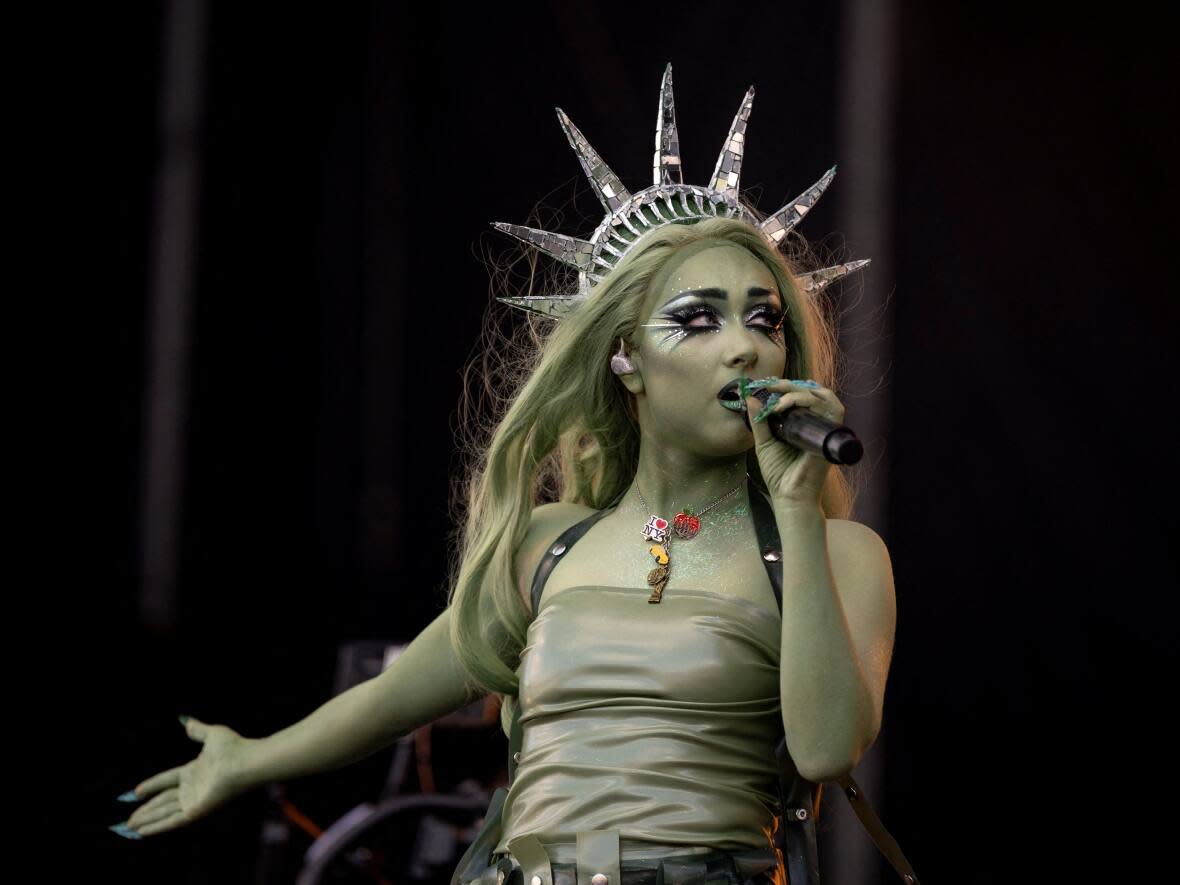Pop singer Chappell Roan says she turned down White House Pride performance

Pop singer Chappell Roan told a crowd of 150,000 on Sunday that she turned down an invitation to perform at the White House's Pride festivities, during a set where she spoke about trans rights, women's rights and freedom for "oppressed people in occupied territories."
Near the end of her set at New York City's Governors Ball music festival, Roan stared into a camera at the side of the stage to say she would be singing the song My Kink is Karma, from her album The Rise and Fall of a Midwest Princess, "as a response to the White House, who asked me to perform for Pride."
"We want liberty, freedom and justice for all," she said. "When you do that, that's when I'll come."
Roan, wearing green body paint and dressed as the Statue of Liberty, quoted a plaque from the iconic statue earlier in her set, saying, "In case you have forgotten what's etched on my pretty little toes: 'Give me your tired, your poor, your huddled masses, yearning to breathe free.'"
Pausing and getting visibly emotional, she continued, "That means freedom in trans rights. That means freedom in women's rights. And it especially means freedom for all oppressed people in occupied territories."
LISTEN | Chappell Roan talks about being discovered, perseverance and the freedom of drag:
The last comment has been widely interpreted as a criticism of the U.S. government's support of Israel in the Israel-Hamas war.
Fans overwhelmingly praised Roan on social media for speaking out in apparent support of Palestinians and queer and trans rights, while some criticized her stance or lamented that she did not use more specific words.
Roan joins a list of notable musicians, writers, actors and athletes who have chosen not to accept invitations to 1600 Pennsylvania Ave., from both sides of the aisle.
Canadian poet Rupi Kaur previously declined a Diwali event invitation from the White House in November, over opposition to the Biden administration's support for the Israeli military attacks on Gaza after the Oct. 7 attacks in southern Israel led by Hamas.
"I refuse any invitation from an institution that supports the collective punishment of a trapped civilian population — 50 per cent of whom are children," said Kaur, whose works include Milk and Honey and The Sun and Her Flowers.
About 1,200 people were killed in the Oct. 7 attack led by Hamas, according to Israel tallies. At least 36,700 Palestinians have been killed in Israel's subsequent assault on Gaza, according to Gaza's Health Ministry, which does not distinguish between fighters and civilians.
Numerous high-profile musicians reportedly turned down invitations to perform at former president Donald Trump's 2017 inauguration, including Elton John and Canada's Celine Dion, who both went on to play Biden's inauguration four years later.
While the non-attendees may get their chosen statements published in the press, they miss a chance to impart that message in person. Though rare, it's not unprecedented for invited guests to roil, or at least challenge, a presidential administration at the White House.
The most famous incident in modern times involved a Canadian. Moments after president Richard Nixon asserted that "I like it square," when introducing the Ray Conniff Singers at a 1972 gala, a member of the group unfurled a small banner reading, "Stop the Killing," in protest of the Vietnam War.
"President Nixon, stop bombing human beings, animals and vegetation. You go to church on Sundays and pray to Jesus Christ. If Jesus Christ were here tonight, you would not dare to drop another bomb," said Toronto-born Carole Feraci, who had lived in the U.S. for years.
Conniff apologized, and Feraci was asked to leave the stage, which she did. Feraci told CBS News in 2023 that she received death threats from people who found her phone number, but that it was important to use one's voice to stand up for human rights.


